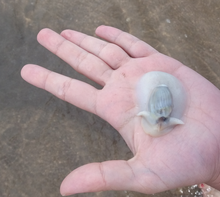en
names in breadcrumbs


Olive snails, also known as olive shells and olives, scientific name Olividae, are a taxonomic family of medium to large predatory sea snails with smooth, shiny, elongated oval-shaped shells.[1]
The shells often show various muted but attractive colors, and may be patterned also. They are marine gastropod molluscs in the family Olividae within the main clade Neogastropoda.
According to the Revised Classification, Nomenclator and Typification of Gastropod Families (2017)[2] the family Olividae consists of five subfamilies:[3]
Olive snails are found worldwide, in subtropical and tropical seas and oceans.
These snails are found on sandy substrates intertidally and subtidally.
The olive snails are all carnivorous sand-burrowers. They feed mostly on bivalves and carrion and are known as some of the fastest burrowers among snails. They secrete a mucus similar to that of the Muricidae, from which a purple dye can be made.
Physically the shells are oval and cylindrical in shape. They have a well-developed stepped spire. Olive shells have a siphonal notch at the posterior end of the long narrow aperture. The siphon of the living animal protrudes from the siphon notch.
The shell surface is extremely glossy because in life the mantle almost always covers the shell.[4][5]
Olive shells first appeared during the Campanian.[6]
Olive shells are popular with shell collectors, and are also often made into jewelry and other decorative items.
The shell of the lettered olive, Oliva sayana, is the state shell of South Carolina in the United States.
Genera within the family Olividae include:

 Specimen from the Argentine coast
Specimen from the Argentine coast Olive snails, also known as olive shells and olives, scientific name Olividae, are a taxonomic family of medium to large predatory sea snails with smooth, shiny, elongated oval-shaped shells.
The shells often show various muted but attractive colors, and may be patterned also. They are marine gastropod molluscs in the family Olividae within the main clade Neogastropoda.